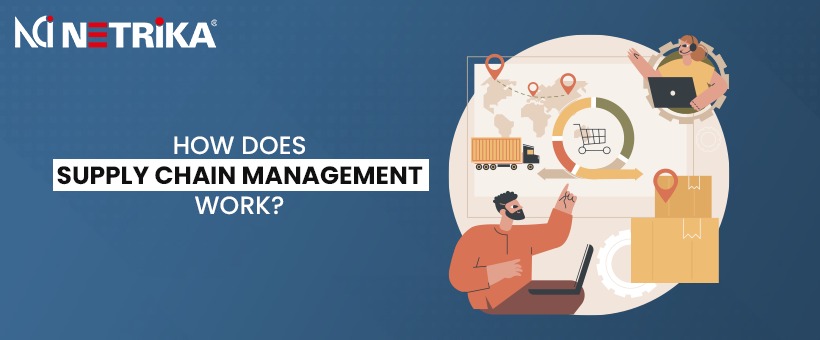News & Events
How does supply chain management work?
- November 20, 2023
- Posted by: marketing@netrika.com
- Category: Blogs

Supply chain management is the management of the data, and finances associated with a product or service from raw material purchase to final product delivery, its inventory at the warehouse and the movement of those commodities. Material handling and software are also included as part of the digitally based supply chain management systems for all parties involved in product or service production, order fulfilment, and information tracking, including manufacturers, suppliers, transportation and logistics providers.
On a larger scale, a supply chain can include but is not limited to:
- Procurement services
- Purchasing raw materials and products
- Software tools and other technology systems
- A unified workforce across the supply chain cycle
- Inventory control management structure
- Demand-Supply forecasting through planning
- Customer service
- Warehousing and operations domain
- Shipping and Transportation
How does the supply chain management work?
For a supply chain management structure to be operational without glitches, the Demand Control, Inventory Management, Sales and Operational Planning, and Product Portfolio Management components must work in unison with each other.
1. Demand Control
Demand control encompasses the practice of foreseeing potential demand based on historical data to ensure that products can be delivered on time. Effective demand planning can improve revenue forecast accuracy, align inventory levels with demand levels, and increase profitability. It includes a methodical strategy for planning, buying, and selling goods to maximise ROI while making products available at the places, times, prices, and quantities demanded by the market.
2. Inventory/Supply Management
Inventory planning determines how to best meet the demands generated by the supply plan. The goal of managing inventory is to balance supply and demand in such a way that the organisation’s financial and service goals are met. It includes production planning which is concerned with a company’s production and manufacturing modules and takes into account employee, material, and manufacturing capacity resource allocation. Inventory planning analyses the best quantity and timing of inventory to match sales and production requirements.
As part of inventory/supply management, the supply chain specialists manage the transportation of goods from a supplier or producer to the point of sale.
3. Sales &Operational Planning
Sales and operations planning is a business management process that enables leadership to focus on key supply chain drivers such as sales, marketing, demand management, manufacturing, inventory management, and new product launches. The purpose of sales and operational planning is to make better-informed decisions through dynamic connectivity of plans and strategies across the organisation.
4. Product Portfolio Management
Product portfolio management is the process of taking a product from ideation to market debut. When a product reaches the end of its lifecycle or if the product does not sell well in the market, the organisation must have an exit strategy in place.
Scaling your career competency with Supply Chain Management Certification at Netriks
Netrika in collaboration with ASIRS provides the supply chain management course certification (CSCSS) to equip professionals with skills and knowledge of supply chain management, scale their career trajectory and help organizations with robust end-to-end security. This supply chain analytics certification increases a professional’s expertise and helps them construct a sound organisational foundation while establishing a satisfying career. Supply Chain Management certification assists in specifying the specialist’s competency, knowledge, and experience to become a successful and efficient manager in the supply chain domain across industry verticals.

